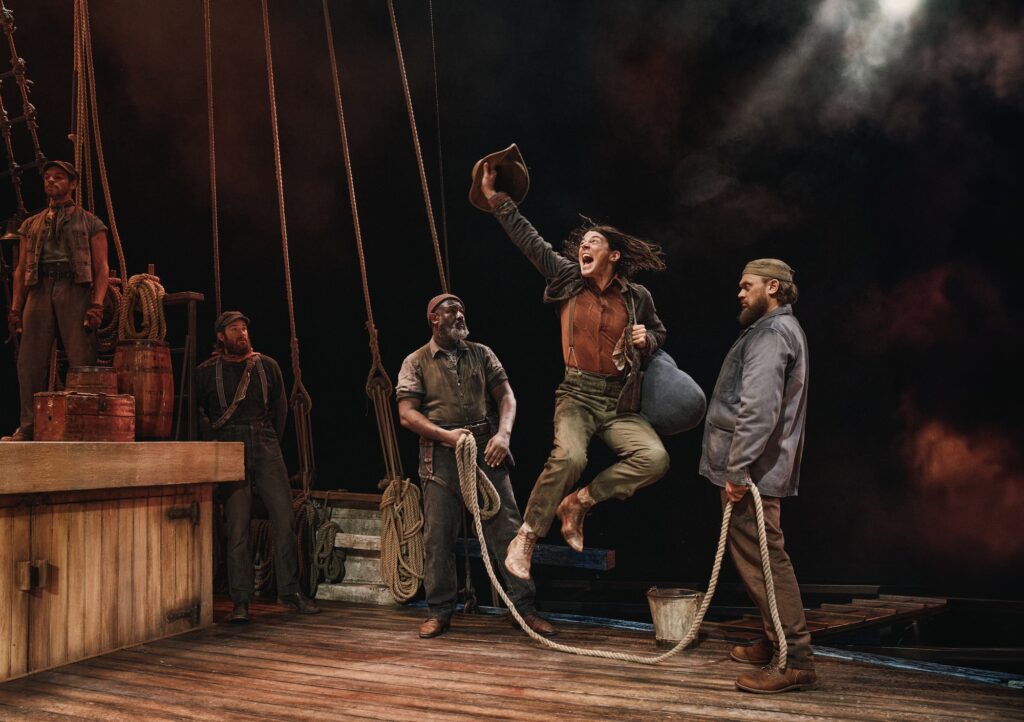‘Swept Away’ Offers Assets Rarely Seen in Contemporary Broadway Musicals, a Fresh Story and a Spiritual Journey
Director Michael Mayer, who has reconciled dark subject matter with musical buoyance in hits such as ‘Spring Awakening’ and ‘American Idiot,’ makes this production sing in every respect.

In a musical adaptation of “Life of Pi” that had its premiere on Broadway last year, the young hero battled hunger, thirst, and the elements after a shipwreck left him stranded on a lifeboat for 227 days. The four men at the center of the new musical “Swept Away” find themselves in a similar situation, but for a shorter time — about three weeks — and with human companionship. (In “Pi,” the protagonist had to settle for illusions of animals.)
For a variety of reasons, though, “Swept Away” provides a more emotionally piercing and haunting experience. The show was inspired by “Mignonette,” a 2004 album by a folk-rock band, the Avett Brothers, that was itself informed by a real-life tragedy involving a British yacht in the 1880s, whose surviving crew members found themselves stranded off the South African coast.
The musical is set in the same time period, but the action unfolds on a whaling ship off the coast of New England, with an American crew. The playwright and screenwriter, John Logan, whose numerous Broadway credits include “Red” and “Moulin Rouge! The Musical,” has crafted a book that folds the Avett Brothers’s songs — culled from “Mignonette” and other albums, with a new, hymn-like tune added — into an original story, focused on a quartet of archetypal characters.
That story could stand as a compelling play on its own, and there are points during the musical’s 90-minute duration, particularly after the catastrophe that leaves the four men sharing a flimsy boat, that seem to invite spoken dialogue more than song and movement. Yet director Michael Mayer, who has reconciled dark subject matter with musical buoyance in hits such as “Spring Awakening” and “American Idiot,” makes this production sing in every respect.
Mr. Mayer has key allies in music supervisor Brian Usifer and colleague Chris Miller, who channel the rootsy textures that have distinguished the Avetts’s material into theatrically savvy arrangements and orchestrations without sacrificing intimacy or grit. Choreographer David Neumann provides spirited choreography for a couple of early production numbers that showcase a robust ensemble.
As much as any musical you’re likely to see this season, though, “Swept Away” relies on the acting chops of its principals, and Mr. Mayer has recruited supple performers, beginning with John Gallagher Jr., a Tony Award winner for his performance as a flailing adolescent in “Awakening.” Here Mr. Gallagher plays another tormented, if more worldly, chap known simply as Mate — a reference to his services on the ship, which are provided with both weary resignation and a lingering taste for disruption.

The show is framed like a memory play, by scenes of an older Mate on his deathbed, in the tubercular ward of a public hospital, where he’s surrounded by the ghosts (or visions) of his fellow passengers on the lifeboat: the ship’s captain, portrayed by stage and screen veteran Wayne Duvall, and a pair of siblings, referred to simply as Big Brother and Little Brother — respectively played by Stark Sands, whose numerous Broadway credits include “American Idiot” and “Kinky Boots,” and Adrian Blake Enscoe, a star of the popular streaming series “Dickinson.”
Not yet out of his teenage years, Little Brother joins the doomed ship’s crew in a bid to experience adventure beyond the farming and churchgoing that have defined his life. Big Brother, a pious young man who revels in these pursuits, climbs aboard in hopes of bringing his sibling back to his senses and back home, but the captain sets sail before either of them can disembark.
Conflicts fester and shaky bonds start to form before disaster strikes, with Mate, predictably, playing shoulder-perching devil — a role he’ll embody almost literally before the show is over — as Big Brother appeals directly and repeatedly to God. This accidental sailor is devoted to the earth as well as heaven, and contrasts are drawn between his love of the land and the captain’s passion for what he calls “the great tragedy of the sea.”
The lead actors also sing beautifully throughout, accommodating the rawness and purity of the Americana-drenched music. (Mr. Enscoe’s clear, pining tenor, never before heard on a Broadway stage, is a standout.) Scenic designer Rachel Hauck’s rugged set reinforces both the pervading sense of peril and the dark romance referred to by the captain, with mirrors above the stage capturing the lifeboat as it floats and swirls — and one horrible, desperate act precipitated by the struggle to survive.
A late twist is involved, and after that the show ends on a note of forgiveness, and redemption. In just one act, “Swept Away” delivers a fresh story and a spiritual journey, both rare assets in contemporary Broadway musicals. Arriving on the heels of the transcendent “Maybe Happy Ending,” it offers a little more cause for optimism.

